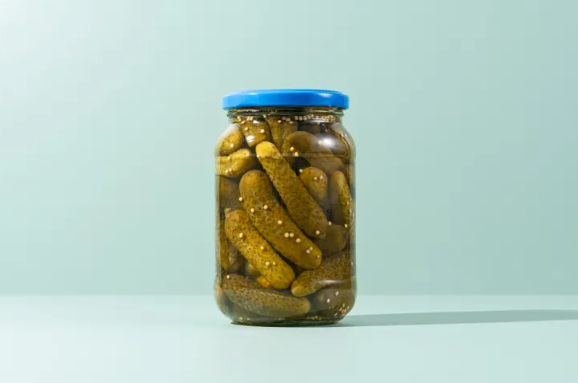Top 7 Fermented Foods to Boost Your Gut Health in 2025
Best Fermented Foods for Gut Health
Probiotics are live bacteria that improve the health of your gut microbiome.
You can eat probiotic-rich fermented foods every day to add more diversity to your gut.
Fermented foods like yogurt, sauerkraut, and kombucha are packed with good bacteria that support gut health and digestion. Research suggests that eating more fermented foods can help balance your gut microbiome, the community of microorganisms in your digestive system. Now this time everybody should try it for good health.
 |
| Fermentation offers ways to enhance food with probiotics. |
Fermentation is one of the oldest methods of food preservation, but its benefits go beyond just shelf life. Fermented foods are packed with probiotics, enhance digestion, boost immunity, and add complex flavors to your meals. The good news? You don’t need to fancy equipment or years of experience to get started. Here’s a breakdown of 7 fermented foods you can easily make at home using basic ingredients and tools.
Why Fermented Foods Matter
Fermentation is an age-old process that not only preserves food but also enhances its nutritional profile. The probiotics (beneficial bacteria) formed during fermentation, and active in fermented foods, help balance the gut microbiome, leading to:
- Improved digestion (reducing bloating and constipation)
- Stronger immunity (a healthy gut is linked to better immune response)
- Better mental health (the gut-brain connection influences mood and anxiety levels)
- Enhanced nutrient absorption (fermentation increases bioavailability of vitamins and minerals)
If you’re not already incorporating fermented foods into your diet, now is the time to start. Here are 7 must-have fermented foods that will take your gut health to the next level.
1. Apple Cider Vinegar
 |
| Photo Credit: jayk7 / Getty Images |
What It Is:
Raw, unfiltered apple cider vinegar (ACV) contains natural probiotics and acetic acid. Make sure it has "the mother" in it and is unpasteurized.
Health Benefits:
- Aids digestion by promoting stomach acid production.
- Helps balance blood sugar levels.
- Supports weight management by improving satiety.
How to Use It:
- Mix a tablespoon into a glass of water before meals.
- Use in salad dressings.
- Add to marinades for a tangy kick.
2. Pickles (Fermented, No Vinegar)
What It Is:
Fermented pickles are cucumbers fermented in saltwater brine (not vinegar).
Health Benefits:
- Provides live cultures for digestion.
- Supports hydration with natural electrolytes.
- Contains vitamin K for blood clotting and bone health.
How to Eat It:
- Enjoy as a snack.
- Add to sandwiches or burgers.
- Chop into salads for extra crunch.
3. Yogurt – The Classic Gut Health Hero
 |
| Photo Credit: Johner Images / Getty Images |
What It Is:
Yoghurt is a fermented dairy product rich in live bacterial cultures .
Health Benefits:
- This fermented food supports digestion and immune function
- High in calcium for strong bones
- Helps balance vaginal microbiota in women
How to Eat It:
- Mix with fruit, granola, or honey.
- Use in dips and salad dressings.
- Add to smoothies for extra creaminess.
4. Sauerkraut – A Supercharged Superfood
| Credit: ollo / Getty Images |
What It Is:
One of the top fermented foods to eat, sauerkraut is fermented cabbage, created through the natural process of lactic acid fermentation. It’s packed with probiotics, vitamin C, and digestive enzymes.
Health Benefits:
- Rich in Lactobacillus bacteria , which supports digestion.
- Helps reduce inflammation and promotes gut lining integrity.
- Boosts the immune system with its high vitamin C content.
How to Eat It:
- Top your baked potatoes with our Sauerkraut for extra flavor.
- Add to sandwiches, wraps, and salads.
- Mix into scrambled eggs or grain bowls.
5. Kimchi – The Spicy Gut Booster
 |
| Credit: Elena Katkova / Getty Images |
What It Is:
Kimchi is a Korean staple made from napa cabbage, radish, garlic, ginger, and chili flakes. One of the most popular fermented foods, it undergoes fermentation, creating beneficial bacteria that aid digestion.
Health Benefits:
- High in probiotics for a balanced gut microbiome.
- Contains capsaicin from chili , which boosts metabolism.
- Supports heart health and reduces cholesterol levels.
How to Eat It:
- Stir into fried rice or noodle dishes.
- Add to tacos or serve alongside eggs.
- Mix with mashed avocado for a spicy guacamole.
6. Kombucha – The Fizzy Probiotic Drink
 |
| Credit: ruizluquepaz / Getty Images |
What It Is:
Kombucha is a fermented tea, naturally fizzy and full of probiotics. It’s made using tea, sugar, and a SCOBY (symbiotic culture of bacteria and yeast) .
Health Benefits:
- Supports liver detoxification .
- Aids digestion by introducing good bacteria.
- Helps reduce sugar cravings due to its natural acidity.
How to Drink It:
- Swap soda for a glass of kombucha.
- Use as a base for mocktails.
- Mix with fresh fruit for a refreshing summer drink.
7. Kefir – The Probiotic Powerhouse
 |
| Credit: Viktoriya Telminova / Getty Images |
What It Is:
Kefir is a fermented dairy drink similar to yoghurt but with up to 61 different strains of beneficial bacteria and yeast. One of the trendiest fermented foods in 2025.
Health Benefits:
- More probiotic diversity than yoghurt.
- Supports lactose digestion, even for those with mild intolerance.
- Contains calcium, magnesium, and vitamin K2 for bone health.
How to Eat It:
- Drink it plain or in smoothies.
- Pour over granola or fruit.
- Use in salad dressings for a tangy twist.
The Bottom Line
Fermented foods contain probiotics, which are good bacteria. Bacteria like to hang out in our guts and they influence our health. Fermented foods also often contain other health boosters, like protein, fiber, vitamins, minerals and antioxidants. Including fermented foods in your diet can mean better overall health, so you should try to add some fermented foods in plate each day.
Frequently Asked Questions
What are fermented foods?
Fermented foods are foods and beverages that have undergone controlled microbial growth and fermentation 1. Fermentation is an anaerobic process in which microorganisms like yeast and bacteria break down food components (e.g. sugars such as glucose) into other products (e.g. organic acids, gases or alcohol). This gives fermented foods their unique and desirable taste, aroma, texture and appearance.
What are the health benefits of fermented foods?
Fermentation can be viewed as a biological method of food preservation. Foods produced in this way have a reduced risk of contamination when enriched in antimicrobial end-products, such as organic acids, ethanol, and bacteriocins. Advantages of fermented foods also include
the new and desirable tastes and textures that are completely unlike those present in the starting materials.
How much fermented food should I eat daily?
On average? Half cup of milk kefir, two cups of either water kefir or some sort of homemade soda. Make a loaf of sourdough bread each week, too. For flavor and ease of process (sourdough is much more reliable for me than dry yeast), not probiotic but fermented. Fermented pickles, or similar projects, occasionally. Use plenty of fermented chili paste and kimchi in cooking, for flavor not probiotics.
What are examples of fermented food?
1. Kefir
2. Kimchi
3. Kombucha
4. Sauerkraut
5. Yogurt
6. Miso
7. Cheese
8. Sourdough
9. Vinegar
Can fermented foods cause gas?
Fermented foods are high in probiotics, which are live bacteria and yeasts that are beneficial for our gut microbiome. However, some strains of probiotics can produce gas and bloating in people with sensitive digestive systems.
Keywords: #Fermented food #anti-carcinogenic #bioactive peptides #cardiovascular disease #lactic acid #bacteria #GutHealth #FermentedFoods #Microbiome






